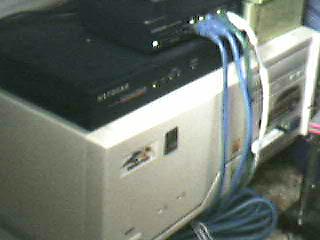Getting Started
Before starting out you need to know if a home server is the right choice, and
what you can get out of a server. I created my first server in 2001 to host a
website, since then and many machines later I use my server more for media and
file storage, but continue to run web services and more.
Home servers can be as versatile as you want, so with the example of
my server, even if it is initially created for one purpose it can be expanded on
later. There are a number of different roles that the server can take with the
more common ones discussed here:
- File: Very common with easy setup, the server brings all your files into one
central location making things easier when it comes to finding up to date
documents and backing up data.
- Print: Wireless printers are starting to take over, but if there is a USB
printer in use then it's easy to connect to the home server and allow all home
computers to use it.
- Media: Bring all your pictures, music and video to the server and share around
the home, access them on TVs, games consoles and tablets. Plus adding streaming
capabilities gives access on many more connected devices.
- CCTV: Capture footage from in and around the home 24 hours a day for
safety and security. Choose from a variety of recording methods and be able to
immediately review footage.
- Web: Have the freedom to create a website without the constraints or extra
charges that come with hosting services. Plus make learning new web technologies
easier by testing and deploying on a local web server.
- VPN: Get secure access to your files when away from home. Plus add an extra layer of security when using public hotspots by creating a VPN gateway.
- Download: With the server always on, internet bandwidth that goes unused when
you are away can be utilized to download content, whether it be regular HTTP,
Usenet or Torrents.
Benefits of a Home Server
My first home server was born as a necessity to create a dynamic content website
without paying the astronomical charges that existed in 2001, but ever since it
has proved to be great learning tool.
Jumping in head first will give hands on learning with aspects of computing.
From hardware components and
configuration, more in depth look a networking both locally and on the internet,
and better understanding in setting up an operating system to work at peak
performance.

My First Home Server, Cira 2001
Above, seperate Router and Network Hub
For the more security conscious a home server allows complete control over data
and what happens with it. Instead of leaving services to a number of different
3rd parties that can lose or sell data, or as history proves even pull the plug
on a whole service with little to no notification. In addition outsourcing the
roles to a number of different service suppliers can add up to be costly,
operating a home server could work out cheaper after any hardware purchases and
ongoing energy consumption.
Things To Consider
While it may be cheaper in the long run, the initial outlay on equipment needs
to be taken into account, setup can cost next to nothing by using an old pc and
the network you already have while at the other end of the scale corporate grade
servers can easily run into thousands.
If purchasing a new machine is viable or the only option, take into
consideration the power consumption and avoid adding extra performance to a
computer that will be seldom used. A server that is running all day every day
can really add to electricity bills, and a high end machine that is doing
something that a low power machine could do just as well exacerbates the cost.
Finally, downtime will become a part of your vocabulary, hosting companies use
this measure as an advertising feature of their quality (if its good, of
course). Even with the most meticulous of planning downtime can crop of at any
time from any location, this can become an issue especially when you are running
internet facing roles such as web and email. To minimise the chances of long
periods of downtime budgeting redundancy options can be considered, ranging from
a spare hard drive as they are the most common failure point in computers, up to
a second server on standby or a backup internet connection.